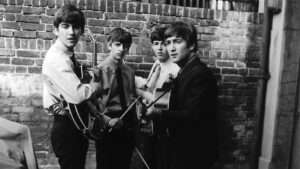I have recently come across two remarkable resources for any of you who are, like me, fascinated [perhaps to the point of obsession] by the early history of rock-and-roll.
The first is the podcast “A History of Rock Music in 500 Songs,” [available at the usual spots, and here] produced by Andrew Hickey. It’s just what it says it is, and it’s pretty astonishing. Each episode tells the story of one song in amazing detail, with a focus on (a) the production: how the song was written, how/why/where it was recorded, who the backing musicians were and how they got there, how they decided to add horns or extra vocals or whatever, etc. etc.—and (b) the music business: who owned the publishing rights and how they got them, who owned the masters and what they did with them, who decided which tracks went on which albums or on 45s (remember 45s?), who got the songwriting credits and why …
The guy has done an unbelievable amount of research, and he tells a great story. I find it mesmerizing (though Hickey’s narrating voice takes a little getting used to). It’s definitely not for everyone; the episodes are pretty substantial in length (an hour or sometimes a bit more), and they contain more than most people probably want to know about, say, how George Martin ended up producing the Beatles because his boss wanted to punish him for being such a pain in the ass (and for having an affair with his secretary), or how Ike Everly, through his contacts at the barber shop that he owned and operated, helped his sons Phil and Don get their first recording contract, or why Dylan didn’t use The Band to back him on Blonde on Blonde, or how Buddy Holly ended up on that airplane because his manager had stolen all of the money The Crickets had earned**, or how The Mob (not a band—the actual Mob) controlled huge swaths of the music business—the clubs, the music publishers and recording companies, the musicians’ unions, etc.—in NYC in the ’50s and ’60s. Etc. etc.
**One of the many, many things about the music industry that I have learned from Hickey is that musicians didn’t have to be black to get ripped off by the “suits,” who were definitely equal-opportunity crooks and shysters.
But if you love this music and want to learn a shitload of stuff you never knew about how it came to be, I highly recommend it. If you want to give it a try, my advice is to pick a song you’re particularly fond of—he’s reached #174, moving chronologically from the beginnings in the late ’30s through 1969 thus far.– and listen to what he has to say about it; that should give you a good sense of whether it’s your kind of thing.
The second is something I picked up on Hickey’s recommendation (in Episode 100 on “Love Me Do,” the Beatles’ first Parlophone single from 1962, which I particularly recommend): Mark Lewisohn’s magnificent and brilliant biography of the Beatles, “Tune In.” This first (of a projected 3 volumes) covers, in 960+ pages (!), the years from their childhoods up to the end of 1962 and the imminent release of their second Parlophone single, “Please Please Me,” which would become the first of 32 (!) Number 1 hits they released over the next 7 years.
I have long thought that no biography could possibly touch Robert Caro’s magnificent multi-volume set on LBJ, but Lewisohn comes very close—an encyclopedic and incredibly engrossing social history of life in Liverpool (and the UK in general) in the immediate post-WWII years, with real insight into the peculiar combination of dumb luck, sheer brilliance, fearlessness, toughness, love, self-confidence, and single-mindedness of purpose, that enabled four teenage working-class school dropouts—from, of all places, Liverpool, a city in the throes of a terrible decline as a consequence of the twin shocks of Britain’s de-industrialization and the ferocious pounding it took from the Germans—were able to transform the global entertainment industry and global culture.
In his Introduction, Lewisohn confronts the obvious question: do we really need 900+ pages and 400,000 words about the early years of what was, after all, just a rock-and-roll band, even one that was an especially terrific and influential one? Here’s what he wrote; I think it’s the best thing I’ve ever read about just how special the Beatles were:
“Every once in a while, life conjures up a genuine ultimate. It can be said without fear of hyperbole, this is what the Beatles were and are. And [sixty]-plus years after they leapt into view—[sixty!]—there’s little hint it’s going to change. So many would-be successors have come and gone, there’s now an acceptance that no-one can be bigger or better. John Winston Lennon, James Paul McCartney, George Harrison, and Richard Starkey hold on strong, universally acknowledged as a cultural force, still somehow current and woven into the fabric of modern lives. John, Paul, George, and Ringo—the four Liverpool lads who pumped the heart of a decade that also won’t shut up, the 1960s.
If it was necessary to “sell” the Beatles, you could point to many achievements, but their music underpins everything. One game-changing album after another, and one game-changing single after another, two hundred and fourteen tracks recorded in seven crowded years in a kaleidoscope of styles. This music is known, loved, respected, discussed, imitated, cherished, and studied. It continues to inspire new artists and be reshaped impressively in every genre. Its song titles and words are adapted for headlines in 21st century media, its quotes are enfolded in everyday vocabulary and chanted in football stadiums. Infused with the Beatles’ energy and personalities, this music still lifts the spirit and is passed joyfully from generation to generation. Clearly, something special happened here—but what? How?
Consider too how the Beatles repeatedly married cutting-edge originality with immense mainstream popularity, when for almost anyone else these are mutually exclusive. And how and why they ditched their winning ideas every time the world raced to copy them. Consider how they did everything with down-to-earth humor, honesty, optimism, style, charisma, irreverence, intelligence, and a particularly spiky disdain for falseness. How they were articulate, bold, curious, direct, instinctive, challenging, blunt, sharp, polite, rude—prickers of pomposity, rule-breakers never cowed by convention. And consider how they created a profound and sustained connection to their public, and how they resisted branding, commercial sponsorship, and corporate affiliation and hype. The Beatles were free of artifice, and weren’t the product of market research or focus groups or TV talent shows. They were original, and developed organically when everyone was looking the other way. . . .
I’ve been waiting for a book this sweeping story demands … one that explains how the society that shaped the Beatles first received them and then was shaped by them, how John, Paul, George, and Ringo dealt with each other as friends and bandmates, how they so deftly handled the media and such phenomenal celebrity, how they transformed the worldwide music industry and shook global youth culture awake, and how they induced a revolution in how people listen to and play music. The Beatles didn’t invent the electric guitar, and weren’t the first guitar group—but every rock band since 1963 is fulfilling their legacy ….”
As with the Hickey podcast, it’s not for everyone. But the Lewisohn book sweeps much more broadly Hickey’s podcast, and I don’t think you have to be quite the same kind of rock-and-roll obsessive to enjoy it and to learn an enormous amount about what the world was like in the middle of the last century.
The post Rock and Roll! appeared first on Reason.com.






